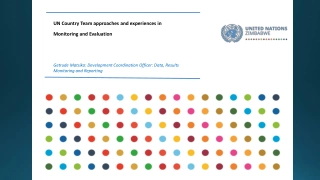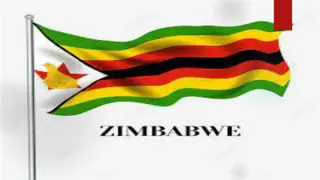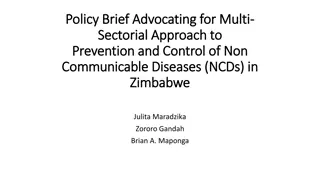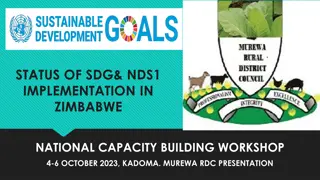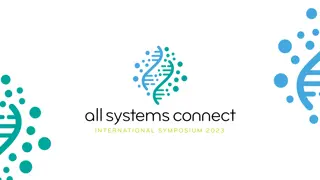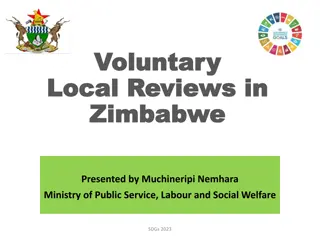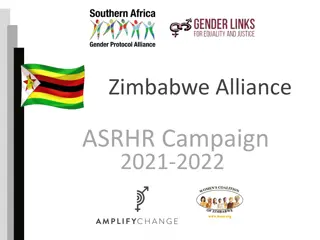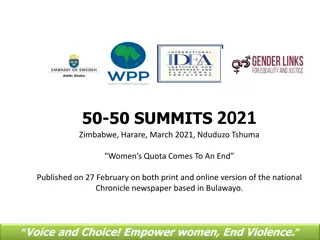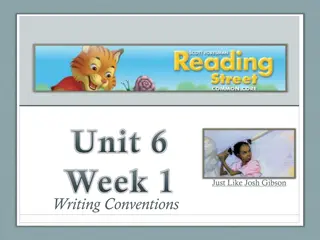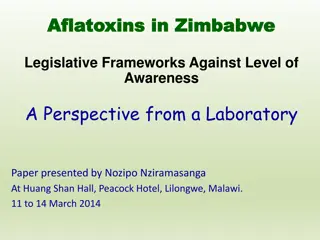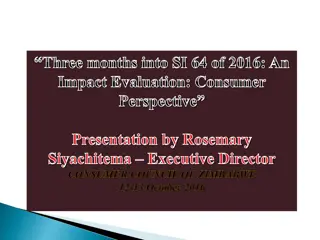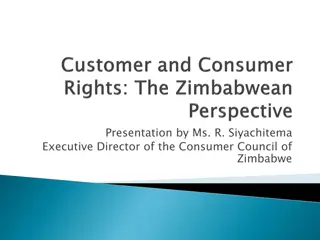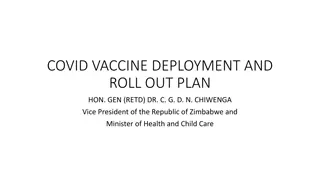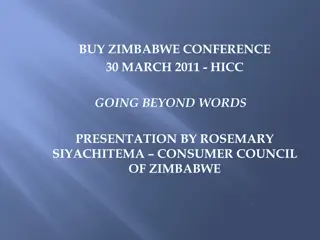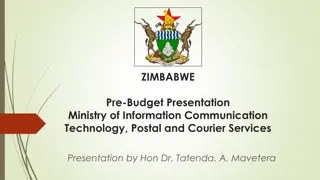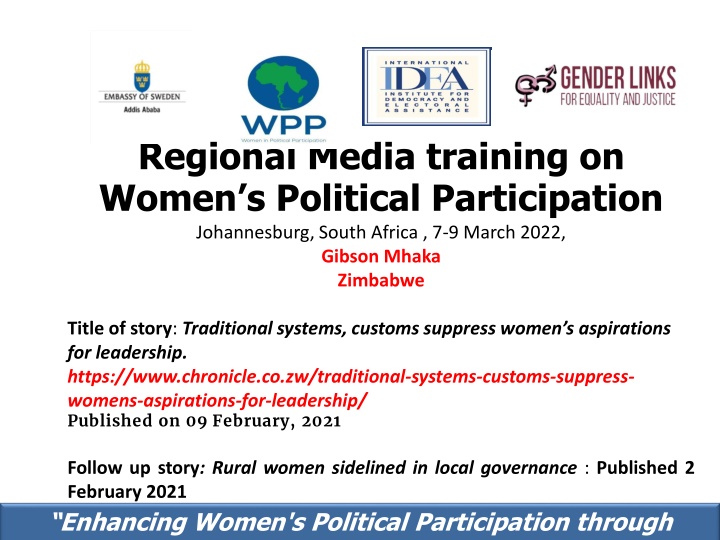
Customs Suppressing Women's Political Participation in Zimbabwe
Explore how traditional systems and customs in Zimbabwe suppress women's aspirations for political leadership, hindering their equal participation in politics. Despite efforts to enhance women's political participation through media, cultural barriers persist, impacting women's representation in national and international politics.
Download Presentation

Please find below an Image/Link to download the presentation.
The content on the website is provided AS IS for your information and personal use only. It may not be sold, licensed, or shared on other websites without obtaining consent from the author. If you encounter any issues during the download, it is possible that the publisher has removed the file from their server.
You are allowed to download the files provided on this website for personal or commercial use, subject to the condition that they are used lawfully. All files are the property of their respective owners.
The content on the website is provided AS IS for your information and personal use only. It may not be sold, licensed, or shared on other websites without obtaining consent from the author.
E N D
Presentation Transcript
Regional Media training on Women s Political Participation Johannesburg, South Africa , 7-9 March 2022, Gibson Mhaka Zimbabwe Title of story:Traditional systems, customs suppress women s aspirations for leadership. https://www.chronicle.co.zw/traditional-systems-customs-suppress- womens-aspirations-for-leadership/ Published on 09 February, 2021 Follow up story: Rural women sidelined in local governance : Published 2 February 2021 Enhancing Women's Political Participation through media.
SYNOPSIS The story is abouthow traditional systems, customs suppress women s aspirations for political leadership. It reflects how existing traditional systems and cultural norms are making it more difficult for women to leave their traditionally domestic roles outside of their homes and participate in the upper echelons of national and international political activities. The story also highlights numerous problems brought about by culture and traditions that continue to suppress women s participation in politics. This is despite the fact that participation of women through gender equality is a prominent issue at the global, national, levels through the enactment of laws, policies and conventions. Enhancing Womens Political Participation through media
Background Zimbabwe, being a patriarchal society, just like other African states has led women to being socialised to believe that they are the helper and not the leader. A woman s place is kept in the private sphere and not to lead in public The story then highlights how the country is thriving under traditional leadership systems that are making it difficult for women to leave their traditionally domestic roles outside of their homes and participate in the upper echelons of national and international political activities. It also shows how customs and traditions still constitute an obstacle to women s enjoyment of their human rights despite the fact that the Government of Zimbabwe has subscribed to international agreements and instituted national policies to improve women s representation Enhancing Women s Political Participation through media
Key Objectives To show that although women constitute more than 50 percent of the country s population, they do not have adequate representation in politics due to numerous cultural practices that are subjugating them to men and hindering their equal and influential participation into politics To explore how gender imbalance in politics is sometimes is a result of traditional systems and customs that excludes women on the basis of culture. Enhancing Women s Political Participation through media
Target audience Members of the public particularly women who are suppressed in their quest to participate in politics on the basis of culture regional bodies like Sadc highlighting that its member states are not committing Declaration on Gender and Development which seeks 50- 50 representation, The Government of Zimbabwe to expose its lack of commitment to promote women s inclusion in politics as enshrined in conventions, protocols and international agreements, The country s political parties who on paper have brilliant gender policies which implemented, gender activists so that they push for the emancipation of women s participation in politics and Traditional leaders (e.g Chiefs) who are custodians of culture and traditional beliefs that continue to suppress women themselves to Sadc s are however, not being Enhancing Women's Political Participation through media
Sources and accessibility Zimbabwe Gender Commission (ZGC) commissioner Mrs Sibongile Chambakale Mauye who is also co-chair of the Thematic Working Group of Stakeholders on Gender, Socio-Cultural and Religious Issues Senior legal practitioner and human rights defender Mrs Nikiwe Ncube-Tshabalala Traditional leaders e.g Chiefs Gorden Bango and Chief Ndube, born is a female chief whose family also experienced a gender-power division when she fought a six-year drawn-out battle with her family members to succeed her late father Policy analyst and Gender activist Tinashe Madamombe Reached through phone calls and face to face interviews Enhancing Women s Political Participation through media
Challenges encountered in putting the story together Female chiefs were not easy to reach since they are very few in the country (six female chiefs out of 272 ,according to Sadc Gender Protocol Barometer of 2018) Mlotshwa family which form the basis of the story through its gender-power divisions could not be interviewed since the matter is still pending at the court therefore is prohibited from public discussion Female politicians were afraid to be interviewed saying they first need clearance from their political parties Enhancing Women's Political Participation through media
Impact The story has managed to show how patriarchy hinder women from obtaining leadership positions even in political participation. It makes women seen not as political actors but rather as pawns to be used in the political maneuvers of men. It has also managed to show how the country is thriving under traditional leadership systems that are responsible for making it more difficult for women to leave their traditionally domestic roles outside of their homes and participate in the upper echelons of national and international political activities. Enhancing Womens Political Participation through media
Feedback Masaisai 17 days ago I think we have to decide if we should be cultural or modern. Trying to mix the two will yield more confusion. My great grandmother was a chief, having inherited it from her father. But this was a direct instruction from my grandfather, then the chief. I don't see how modern courts can take jurisdiction over cultural traditions. In this particular case, on what basis, cultural practice, law or modern law or statute is this lady claiming chieftainship? manyears mdutshwa chuchu 18 days ago zvakanaka muchitaura pachirungu asi nyaya iripo iri ye hunhu pachivanhu zvotisiyanei zvino muchatoregwa humambo nevatogwa ngekuti mwana wamai mambo achada kutora umambo hwa mai vake (In short the contributor is also against the idea for a daughter inheriting her late father as a chief saying that will lead or create problems in future when the son of that daughter wanted to inherit her mother as a chief after she dies. The contributor is also saying as Africans we should not allow western culture to dominate or diffuse our cultural practices). Enhancing Women's Political Participation through media
Follow up story published Rural women sidelined in local governance Published 2 February 2021 Enhancing Women's Political Participation through media

